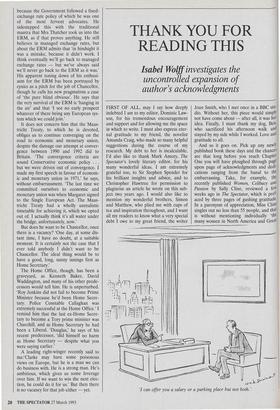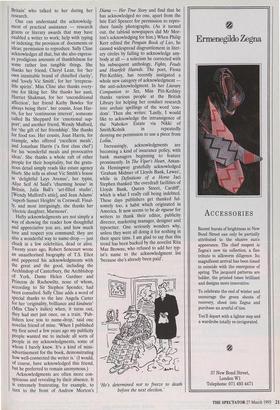THANK YOU FOR READING THIS
Isabel Wolff investigates the
uncontrolled expansion of author's acknowledgments
FIRST OF ALL, may I say how deeply indebted I am to my editor, Dominic Law- son, for his tremendous encouragement and support and for allowing me the space in which to write. I must also express eter- nal gratitude to my friend, the novelist Amanda Craig, who made so many helpful suggestions during the course of my research. My debt to her is incalculable. I'd also like to thank Mark Amory, The Spectator's lovely literary editor, for his many wonderful ideas. I am extremely grateful too, to Sir Stephen Spender for his brilliant insights and advice, and to Christopher Hawtree for permission to plagiarise an article he wrote on this sub- ject two years ago. I would also like to mention my wonderful brothers, Simon and Matthew, who plied me with cups of tea and inspiration throughout, and I want all my readers to know what a very special debt I owe to my great friend, the writer Joan Smith, who I met once in a BBC stu- dio. Without her, this piece would simplY not have come about — after all, it was her idea. Finally, I must thank my dog, Ben, who sacrificed his afternoon walk and stayed by my side while I worked. Love and gratitude to all. And so it goes on. Pick up any newlY published book these days and the chances are that long before you reach Chapter One you will have ploughed through page upon page of acknowledgments and declk cations ranging from the banal to the embarrassing. Take, for example, the recently published Women, Celibacy and Passion by Sally Cline, reviewed a feW weeks ago in The Spectator, which is pre aced by three pages of gushing gratitude. In a paroxysm of appreciation, Miss Cline singles out no less than 55 people, and that is without mentioning individually 'the many women in North America and Great 'I can offer you a salary or a parking place but not both.' Britain' who talked to her during her research.
One can understand the acknowledg- ment of practical assistance — research grants or literary awards that may have enabled a writer to work; help with typing or indexing; the provision of documents or ideas; permission to reproduce. Sally Cline acknowledges all that, but she also express- es prodigious amounts of thankfulness for some rather less tangible things. She thanks her friend, Cheryl Lean, for `her own inimitable brand of chiselled clarity', and `lovely Vic Smith', for her 'irrepress- ible spirits'. Miss Cline also thanks every- one for liking her. She thanks her aunt, Harriet Shakman, for her `unconditional affection', her friend Kathy Bowles `for always being there', her cousin, Joan Har- ris, for her `continuous interest', someone called Ba Sheppard for 'emotional sup- port', and another friend, Wendy Mulford, for `the gift of her friendship'. She thanks for food too. Her cousin, Joan Harris, for example, who offered `excellent meals', and Jonathan Harris Ca first class chef) for his `wonderful meals and provocative Ideas' . She thanks a whole raft of other People for their hospitality, but the gratu- itous detail simply reads like estate agency blurb. She tells us about Vic Smith's house In `delightful Leys Avenue', her typist, Aliye Seif Al Said's `charming house' in Britain, Julia Ball's `art-filled studio', [Wendy Mulford's attic], and Jean Adams' `superb Sunset Heights' in Cornwall. Final- ly, and most intriguingly, she thanks her `electric daughter, Marmoset'.
Hefty acknowledgments are not simply a way of showing the reader how thoughtful and appreciative you are, and how much love and respect you command; they are also a wonderful way to name-drop — just Chuck in a few celebrities, dead or alive. Twenty years ago, Robert Sencourt wrote an unauthorised biography of T.S. Eliot and peppered his acknowledgments with the great and the good, including the Archbishop of Canterbury, the Archbishop of York, Dame Helen Gardner and Princess de Rachewiltz, none of whom, according to Sir Stephen Spender, had been consulted. Sally Cline adds a word of special thanks to the late Angela Carter for her 'originality, brilliance and kindness' (Miss Cline's italics) when, it turns out, they had met just once, on a train. `Pub- lishers love you to name-drop,' said one novelist friend of mine. `When I published my first novel a few years ago my publicity People wanted me to include all sorts of People in my acknowledgments, some of Whom I barely knew. It's a kind of mini- advertisement for the book, demonstrating how well-connected the writer is.' (I would, of course, have acknowledged this friend, but he preferred to remain anonymous.) Acknowledgments are often more con- spicuous and revealing by their absence. It is extremely frustrating, for example, to turn to the front of Andrew Morton's Diana — Her True Story and find that he has acknowledged no one, apart from the late Earl Spencer for permission to repro- duce family photographs. (As it turned Out, the tabloid newspapers did Mr Mor- ton's acknowledging for him.) When Philip Kerr edited the Penguin Book of Lies, he caused widespread disgruntlement in liter- ary circles by failing to acknowledge any- body at all — a solecism he corrected with his subsequent anthology, Fights, Feuds and Heartfelt Hatreds. The poet, Fiona Pitt-Kethley, has recently instigated a whole new category of acknowledgment — the anti-acknowledgment. In her Literary Companion to Sex, Miss Pitt-Kethley thanks various people at the British Library for helping her conduct research into archaic spellings of the word `con- dom'. Then she writes: 'Lastly, I would like to acknowledge the intransigence of the Nabokov Estate via Nikki of Smith/Kolnik in repeatedly denying me permission to use a piece from Lolita.'
Increasingly, acknowledgments are becoming a kind of insurance policy, with bank managers beginning to feature prominently. In The Viper's Heart, Aman- da Hemingway gratefully acknowledged `Graham Midmer of Lloyds Bank, Lewes', while in Definitions of a Horse Jaci Stephen thanked `the overdraft facilities of Lloyds Bank, Queen Street, Cardiff, which is what I really call being indebted. These days publishers get thanked ful- somely too, a habit which originated in America. It now seems to be de rigueur for writers to thank their editor, publicity director, marketing manager, designer and typesetter. One seriously wonders why, unless they were all doing it for nothing in their spare time. I am glad to say that this trend has been bucked by the novelist Rita Mae Browne, who refused to add her typ- ist's name to the acknowledgment list `because she's already been paid'.
'He's determined not to freeze to death before the next election.'



























































 Previous page
Previous page